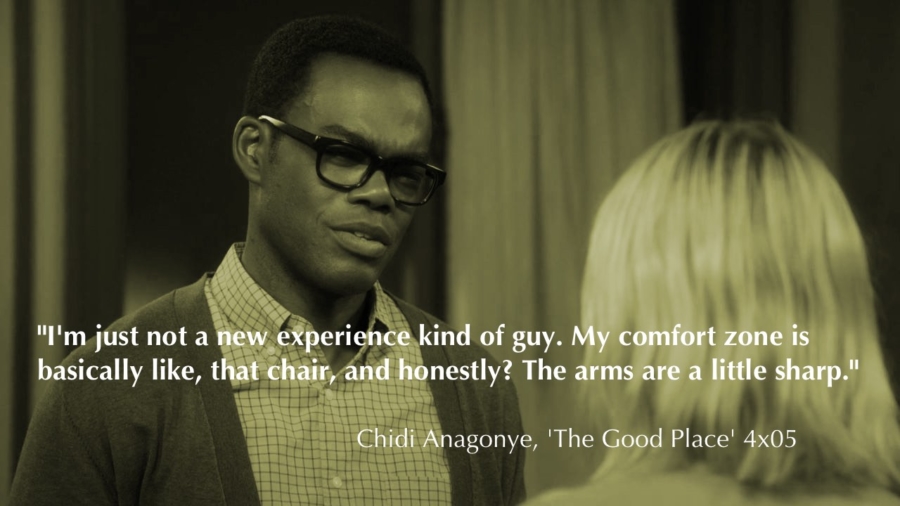I have been facilitating a series of sessions online for people struggling with anxiety and its various symptoms. I usually love bringing in relatable examples to help people forge deeper, more meaningful connections with the message I am trying to convey, and as I was exploring the broad realm of anxiety, the character of Chidi from The Good Place popped in my mind a number of times!
For those wondering what to watch next on Netflix in the midst of the lockdown, if you haven’t seen it already, please, please, please watch The Good Place. It’s one of the smartest shows in recent years that I have watched – I’ve often found myself saying that media fails people with mental illnesses by its inaccurate portrayals on so many different levels, and as I write this post, I can actually feel my heart skipping with joy for The Good Place has definitely got the formula for depicting mental illness right, and other shows can definitely learn a thing or two from it.
When I first started watching the show, it was the outlandish concept of Eleanor Shellstrop accidentally finding herself in Heaven (or “The Good Place”) and navigating her way through intricacies set in motion by Michael, the afterlife architect that seemed attractive, but as the show progressed, it actually explodes into a beautifully goofy and creative exploration of some of life’s most complex questions. The show has a unique depiction of traditional concepts and systems like that of Heaven and Hell, ethical and moral codes, and in its wonderfully weird way, brings into awareness the realization that these need reform without being extremely preachy or over-the-top funny – that is an intricate balance that very few shows are able to achieve. The concept is clever, but it is also extremely well-backed up by the character arcs that define the story-line which makes The Good Place a show that has great entertainment value as well as makes for an effective social commentary.
In this post, I am choosing to focus only on Chidi, even though there are a few other individuals who we can also study from the mental illness perspective. There are minor spoilers ahead, but trust me, they many only enhance your viewing of the show instead of taking something away from it…
When we are introduced to Chidi, he is not introduced as a character who you would think struggles with issues pertaining to mental health. In fact, out of the four human protagonists (I say four, not five, because Janet is a robot and, technically, not a human being on the show!), Chidi is the most intelligent, he seems to have an impressive accumulation of social and emotional knowledge, and he is a good person. As an audience, it’s easy to fall in love with Chidi – we don’t doubt for even one minute why he, as the main character’s soulmate, seems too good for her. I found this introduction brilliant on so many levels! When you meet someone with a mental health label for the very first time, you cannot figure it out in the beginning. It is not obvious. They seem to be just like normal, regular people (and I am using these adjectives only for lack of better terms to drive my message across) – basically, what I am trying to say is that not everyone with a mental health label like anxiety, for instance, will fit into the stereotype of the token anxious person in the way that media usually typecasts people with such labels. In real life, we may get to know someone like Chidi just as a person like any other without any visible signs of a mental illness. We all wear masks which we take off only when we can trust the other person completely, or when we need to out of necessity, and it is only over time that, in the show, just like we would in real life, start noticing the signs of anxiety that he is holding in all the time, we notice how he is constantly scared, constantly worried, and he just cannot decide! We then start getting irritated at Chidi’s behaviour and his indecisiveness is, at times, beyond frustrating! I found myself wondering so many times, “Why can’t he just decide?” And I realize it comes from a space of not knowing what’s going on inside his head, and because we are unaware, we judge. I actually applaud the writers for waiting until the third season to reveal Chidi’s lifelong struggles with anxious thoughts, because by doing so, the writers invariably are attempting to end the stigma that surrounding conventionally ‘anxious’ characters, and bringing into light the real world of people struggling with anxiety.
Usually, when we view popular media, people with supposedly “abnormal” mental and emotional experiences are portrayed as exceptional, standing out, often eccentric…The “mad” in popular culture fall into several generic stereotypes:
- Antagonists who are violent because they are “mentally ill” (the internet is filled with many articles about the Joker and Harley Quinn’s abusive romance);
- Those whose madness is supposedly a cover that hides their wisdom (for example, Rafiki in The Lion King);
- Superheroes whose powers come from being mentally and emotionally “messed up” (like Eleven in Stranger Things, or Storm from the X-Men Series to some degree);
- The quintessential “smarty-pants” whose intellectual giftedness makes them extraordinarily smart but unable to interact with others at a social and emotional level (like Sheldon Cooper from The Big Bang Theory or Young Sheldon).
As a collective, these characters stand out as pretty unkind (and unimaginative, after a point) clichés, and all bunched together, it often feels like these characters are somewhat just used to make a point or get a few laughs. Such ideas about disability, distress and mental illness have real effects for real people. Being “mad” or labelled “crazy”, struggling with a mental illness, being emotionally unable to cope has long been a reason to be cast out from society. Chidi, however, does not necessarily stand out or fit into one imaginable cliché. While Chidi does have some truly comical experiences of anxiety on the show (like his frequent stomachache, for instance), he is likeable and the portrayal of his distress and “madness” is not offensive in any way. Even people with anxiety who have seen the show say that Chidi’s experiences made them laugh even if it was relatable on so many levels!
The Good Place, as it progresses, while enabling us to empathize with a person who really struggles with anxiety, also brings to light the ways in which anxiety can hurt people and we see how Chidi’s anxiety hurts him and his friends, even though he is really trying hard all the time to be a good person. This is one of the most impressive portrayals of anxiety that I have seen on television – not only does your understanding of it and of the person in question evolve over times, and sometimes you are able to empathize and look at the positive elements, you are able to say that you understand, yet, at the same time, and then there are moments when you are just so frustrated and wonder what the hell is going on. We all go through these experiences and it’s really wonderful how the show has managed to depict that appropriately.
More than anything else, The Good Place succeeds in showing that when Chidi learns to manage the levels of anxiety, he is thoughtful, hardworking, an amazing friend, an excellent teacher, and a fabulous mentor. You can’t help falling in love with Chidi throughout his journey from appearing almost perfect to suddenly seeming human with a full history of anxiety, and that is how I know The Good Place got its formula right!
Along with insights into the experience of anxiety, you may also just realize how all of us can be good – even actual demons – we just need some help getting there. Also, on a slightly unrelated note, you may actually realize that it is possible to be funny while, at the same time, being thoughtful. How does it get better than that? What else is possible?
The final season (Season 4) is not out in India yet, and I am waiting for it to be released soon. Until that arrives, I hope you do give The Good Place a visit and tell me more about your trip there!

